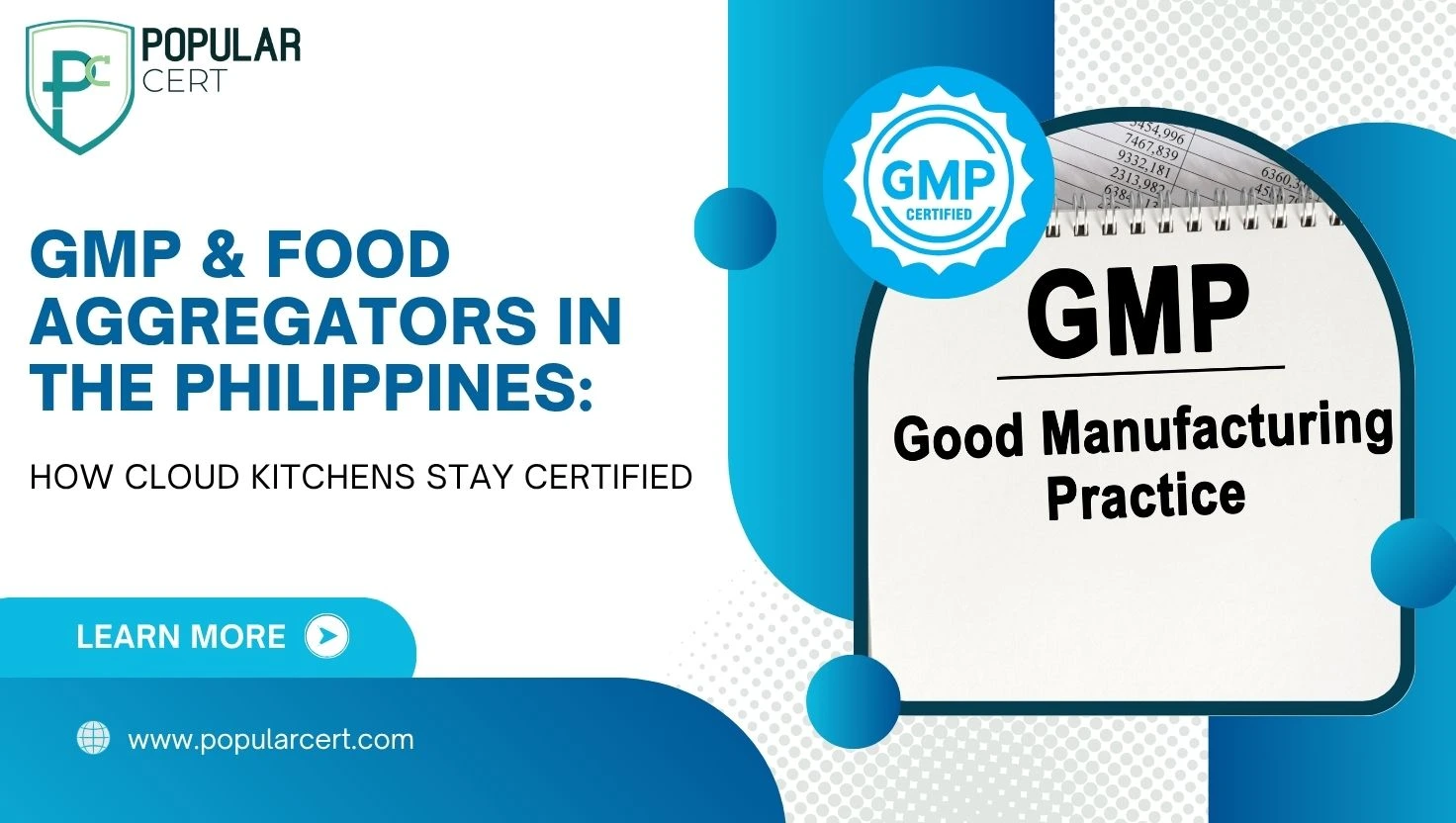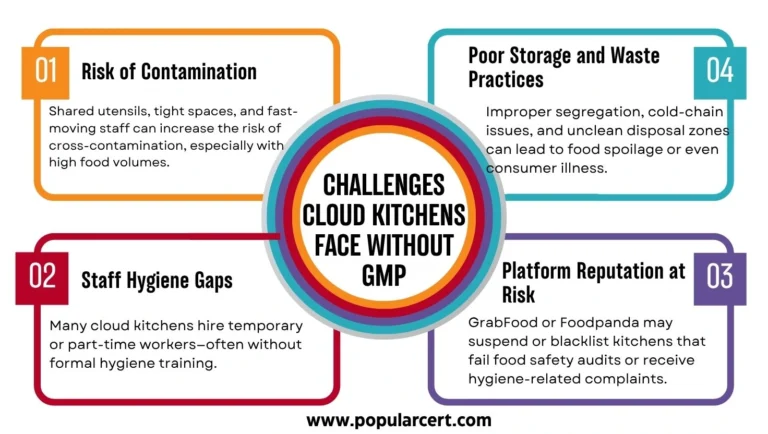GMP & Food Aggregators in the Philippines: How Cloud Kitchens Stay Certified

With the ever-increasing use of modern technology, our lifestyles have drastically evolved. The emergence of cloud kitchens is a great example of how modern technology is changing the world. Cloud kitchens are an exceptional example of modern technology. These types of kitchens only serve food through online orders from various sponsors. These products can be purchased without setting foot in the restaurant.
However, these kitchens struggle with upholding standards such as health compliance and hygiene.
With the robust increase of demand, customer happiness, and product quality, risk of neglecting food safety practices is alarmingly high.
For aggregators and kitchens based in the Philippines, adhering to good manufacturing processes – GMP Certification In Philippines provides a streamlined approach to maintaining compliant and scalable production, while upholding meticulous hygiene requirements.
What is Good Manufacturing Processes and how it pertains to cloud kitchens
What does GMP stand for
Good Manufacturing Practices keeps international standards compliance while manufacturing products in bulk quantity and ensures that all food products are prepared in a systematic manner through hygienic and critical solutions. Proper cleanliness, monitoring food storage conditions, medical intervention documentation, and transport of food are some of the services included in GMP.
Why Cloud Kitchens Need It More Than Ever
Unlike traditional restaurants, cloud kitchens operate in compact, shared, or even multi-brand spaces. With limited staff visibility, rapid order flows, and reliance on third-party logistics, the margin for error is razor-thin. GMP Certification helps address this by enforcing discipline, transparency, and traceability at every step.
GMP Guidelines for Cloud Kitchens Operating in the Philippines
Fundamental Questions of GMP for Food Aggregators
- Cleanliness and Sanitation: Scheduled deep cleaning and rigorous personal hygiene protocols.
- Storage Practices: Temperature logs and stock rotation for refrigerable items. FIFO (First In First Out) stock rotation for refrigerated items and sealed containers for ingredients.
- Training & Staff Qualifications: Hygiene, PPE, food safety, and general handling procedures training.
- Cross-Contamination Prevention: Use of color-coded cutting boards and tool segregation for raw vs cooked items.
- Record Keeping, Documentation & Traceability: Standard Operating Procedures (SOPs), temperature monitoring logs, waste disposal documentation, and pest control logs.
Philippines Regulatory Body Scope
- FDA Philippines: Covers food safety governance under 2013 Food Safety Act.
- Department of Health: Oversees compliance with sanitation and hygiene practices.
- LGUs and barangays: Local enforcement of business permits and kitchen inspections.
Types Of Certification
- ISO Certification
- ISO 9001 Certification
- ISO 14001 Certification
- ISO 45001 Certification
- ISO 22000 Certification
- ISO 27001 Certification
- ISO 17025 Certification
- ISO 13485 Certification
- ISO 20000-1 Certification
- ISO 22301 Certification
- ISO 50001 Certification
- ISO 37001 Certification
- IATF 16949 Certification
- ISO 29001 Certification
- ISO 31000 Certification
- ISO 20121 Certification
- ISO 10002 Certification
- ISO 41001 Certification
Get Free Consultation
Our Clients


















Challenges Cloud Kitchens Face Without GMP

How to Get GMP Certified in the Philippines
GMP Certification Process—Step By Step
- Gap Analysis: Assess existing kitchen arrangements against GMP standards.
- Documentation & SOPs: Establish policies for food handling, cleaning, and inspections.
- Training Sessions: Provide hazard awareness, hygiene, and GMP compliance sessions to relevant personnel.
- Mock Audits: Evaluate preparedness and address non-compliance issues.
- Third-Party Audit & Certification: Get assessed by an accredited body and receive your GMP certificate.
How Popularcert Helps
Popularcert is focused on certification of food safety for businesses that are on a growth trajectory. For cloud kitchens, we offer:
- On-site or online audits specific to your kitchen layout
- Comprehensive documentation assistance
- Specialized training for shift-covering staff
- Fast track certification with limited operational disturbance
Benefits of GMP Certification for Cloud KitchensEnhanced
- Quality and Hygiene Standards for Food : Economically certified kitchens exhibit lower customer complaints, diminished food returns, and improved standardization in flavor and visual appeal.
- Perception and Credibility on Platforms : Hygiene certified kitchens may be promoted or given priority by food delivery applications. Some may require GMP as part of compliance in the near future.
- Enhanced Trust from Consumers : GMP certificates can be showcased on aggregator applications, packaging, and social media, demonstrating commitment to safety and quality.
Real World Example: Manila Cloud Kitchen with GMP Certification
KitchenHero PH, a cloud kitchen in Quezon City, suffered with low food ratings due to poor adherence to hygiene protocols. After working with Popularcert, they:
- Taught cross-contamination through shared high-risk areas such as chopping boards.
- Mandatory PPE and sanitation for all staff.
- Redesigned waste management and cold storage.
They achieved GMP certification in 45 days. Customer review ratings improved, Foodpanda flagged them as a top vendor, and they increased their order volume by 28%.
Common GMP Mistakes to Avoid
- Not documenting procedures
- Ignoring delivery hygiene (especially rider contact areas)
- Storing raw and cooked foods together
- Overlooking pest control or expired items
- Skipping staff re-training after high turnover
Is GMP Mandatory for Cloud Kitchens in the Philippines?
While GMP certification is not yet mandatory, government inspections and platform audits are tightening.
Under the Food Safety Act (RA 10611) and FDA AO No. 2014-0029, all food businesses must meet hygiene and sanitation requirements. GMP Certification ensures you’re always audit-ready.
Plus, with health-conscious consumers and aggregator compliance policies, GMP is quickly becoming an industry must-have.
Maintaining GMP Compliance Post-Certification
- Sustaining Post-Certification Compliance
- You must conduct internal audits once every 3 month period
- Cleaning and disposal activities should take place every day
- Give your workers training twice a year
- Ensure that all devices show precise and accurate information
Write down procedures on paper whenever new items or procedures are set into place in the business.
Conclusion: Embracing Certification to Foster Growth for Delivery Kitchens
As the industry for culinary cloud kitchens grows faster in the Philippines, the ability to sustain compliance would provide a way to ensure it sticks around for a long time. The GMP programme guarantees the offered safety and first policy, best practice, operational credibility, and strategic value for the business.
Even if you are a single-brand delivery kitchen or managing multiple partnerships with food aggregators, you can’t ignore GMP Certification. This isn’t just a business strategy—it serves as your competitive edge in the market.
Ready to Get GMP Certified?
From planning and documentation to audit and compliance, Popularcert can guide your cloud kitchen towards achieving full GMP certification.
For food safety excellence and trust in your platform, schedule a free consultation with Popularcert today and take the first step.
Expand your food business while ensuring compliance, credibility, and building confidence in your brand.
GET A FREE CONSULTATION NOW
FAQs
Is GMP certification mandatory for cloud kitchens in the Philippines?
GMP Certification is not legally mandatory, but it is strongly recommended. Regulatory bodies like the FDA Philippines require food safety compliance, and food aggregators often favor certified kitchens for better trust and reliability.
How long does it take for a cloud kitchen to get GMP certified?
The GMP certification process typically takes 30 to 60 days, depending on your kitchen’s readiness, documentation, and training. Popularcert offers accelerated certification plans for cloud kitchens in the Philippines.
What documents are needed for GMP certification?
Key documents include Standard Operating Procedures (SOPs), cleaning schedules, pest control logs, staff hygiene protocols, and storage records. Popularcert can help you prepare all necessary documentation.
Can a shared or multi-brand kitchen get GMP certified?
Yes, shared and multi-brand cloud kitchens can get GMP certified as long as hygiene zones are defined, cross-contamination is controlled, and all brands follow a unified food safety protocol.
